I just deployed a Rails app to Elastic Beanstalk, and every request is giving me a 502 error.
Here's the contents of /var/logs/nginx/error.log
2015/05/20 16:24:25 [warn] 1535#0: conflicting server name "localhost" on 0.0.0.0:80, ignored
2015/05/20 16:27:12 [crit] 1537#0: *20 connect() to unix:///var/run/puma/my_app.sock failed (2: No such file or directory) while connecting to upstream, client: 172.31.51.94, server: _, request: "POST /get HTTP/1.1", upstream: "http://unix:///var/run/puma/my_app.sock:/get", host: "securities-api-prod.elasticbeanstalk.com"
2015/05/20 16:27:17 [crit] 1537#0: *20 connect() to unix:///var/run/puma/my_app.sock failed (2: No such file or directory) while connecting to upstream, client: 172.31.51.94, server: _, request: "POST /get HTTP/1.1", upstream: "http://unix:///var/run/puma/my_app.sock:/get", host: "securities-api-prod.elasticbeanstalk.com"
2015/05/20 16:27:19 [crit] 1537#0: *20 connect() to unix:///var/run/puma/my_app.sock failed (2: No such file or directory) while connecting to upstream, client: 172.31.51.94, server: _, request: "POST /get HTTP/1.1", upstream: "http://unix:///var/run/puma/my_app.sock:/get", host: "securities-api-prod.elasticbeanstalk.com"
2015/05/20 16:27:22 [crit] 1537#0: *16 connect() to unix:///var/run/puma/my_app.sock failed (2: No such file or directory) while connecting to upstream, client: 172.31.44.210, server: _, request: "GET /datapoint?tickers=AAPL&datapoints=Ratings HTTP/1.1", upstream: "http://unix:///var/run/puma/my_app.sock:/datapoint?tickers=AAPL&datapoints=Ratings", host: "securities-api-prod.elasticbeanstalk.com"
2015/05/20 16:27:27 [crit] 1537#0: *20 connect() to unix:///var/run/puma/my_app.sock failed (2: No such file or directory) while connecting to upstream, client: 172.31.51.94, server: _, request: "POST /get HTTP/1.1", upstream: "http://unix:///var/run/puma/my_app.sock:/get", host: "securities-api-prod.elasticbeanstalk.com"
2015/05/20 16:27:32 [crit] 1537#0: *20 connect() to unix:///var/run/puma/my_app.sock failed (2: No such file or directory) while connecting to upstream, client: 172.31.51.94, server: _, request: "POST /get HTTP/1.1", upstream: "http://unix:///var/run/puma/my_app.sock:/get", host: "securities-api-prod.elasticbeanstalk.com"
2015/05/20 16:28:53 [crit] 1537#0: *52 connect() to unix:///var/run/puma/my_app.sock failed (2: No such file or directory) while connecting to upstream, client: 172.31.51.94, server: _, request: "GET /datapoint?tickers=AAPL&datapoints=Ratings HTTP/1.1", upstream: "http://unix:///var/run/puma/my_app.sock:/datapoint?tickers=AAPL&datapoints=Ratings", host: "securities-api-prod.elasticbeanstalk.com"
2015/05/20 16:30:47 [crit] 1537#0: *69 connect() to unix:///var/run/puma/my_app.sock failed (2: No such file or directory) while connecting to upstream, client: 172.31.51.94, server: _, request: "POST /get HTTP/1.1", upstream: "http://unix:///var/run/puma/my_app.sock:/get", host: "securities-api-prod.elasticbeanstalk.com"
I think puma is running -
[ec2-user@ip-172-31-44-135 nginx]$ ps aux | grep puma
root 23299 1.0 0.2 53008 1428 ? Ss 16:38 0:00 su -s /bin/bash -c puma -C /opt/elasticbeanstalk/support/conf/pumaconf.rb webapp
webapp 23314 0.0 2.4 75764 14604 ? Rsl 16:38 0:00 /opt/rubies/ruby-2.1.4/bin/ruby /opt/rubies/ruby-2.1.4/bin/puma -C /opt/elasticbeanstalk/support/conf/pumaconf.rb
ec2-user 23317 0.0 0.1 110284 844 pts/0 S+ 16:38 0:00 grep puma
pumaconf.rb
directory '/var/app/current'
threads 8, 32
workers %x(grep -c processor /proc/cpuinfo)
bind 'unix:///var/run/puma/my_app.sock'
stdout_redirect '/var/log/puma/puma.log', '/var/log/puma/puma.log', true
daemonize false
Anyone know what's going on?
